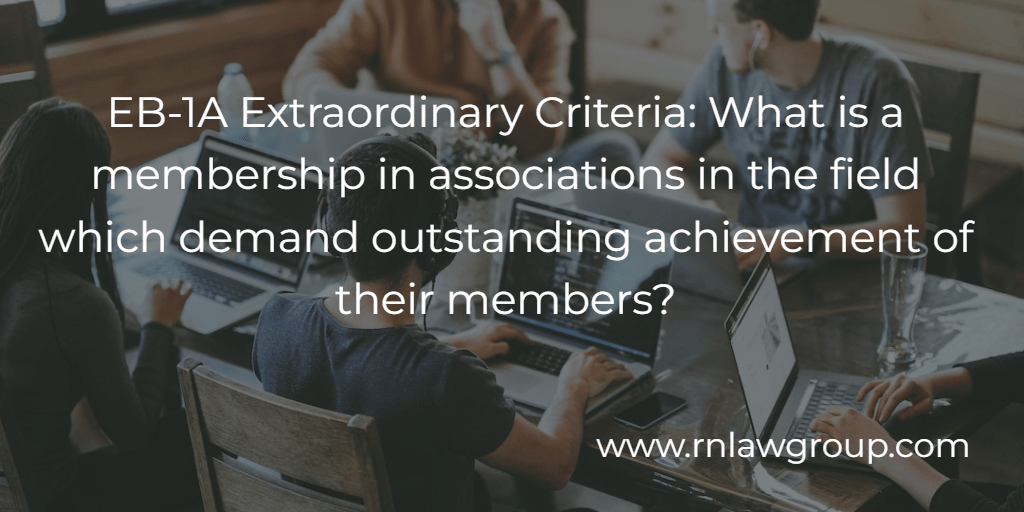
EB-1A Extraordinary Criteria: What is a membership in associations in the field which demand outstanding achievement of their members?
The EB-1A employment-based immigration visa can appear to be a daunting process. An applicant must either show proof of a one-time achievement (major internationally-recognized award) meet 3 of the 10 listed criteria:
- Evidence of receipt of lesser nationally or internationally recognized prizes or awards for excellence
- Evidence of your membership in associations in the field which demand outstanding achievement of their members
- Evidence of published material about you in professional or major trade publications or other major media
- Evidence that you have been asked to judge the work of others, either individually or on a panel
- Evidence of your original scientific, scholarly, artistic, athletic, or business-related contributions of major significance to the field
- Evidence of your authorship of scholarly articles in professional or major trade publications or other major media
- Evidence that your work has been displayed at artistic exhibitions or showcases
- Evidence of your performance of a leading or critical role in distinguished organizations
- Evidence that you command a high salary or other significantly high remuneration in relation to others in the field
- Evidence of your commercial successes in the performing arts
These criteria can make even very well qualified candidates nervous about their eligibility, but with the right experience, the right lawyer, and a little luck, an applicant can have their Green Card in as little as three months. This series of articles will provide a background on each of the 10 criteria, examples of documents that can meet them, and common pitfalls to avoid.
Membership in these organizations is viewed as a powerful indicator of a person’s exceptional talent in their profession. These organizations must be prestigious and selective, admitting only those who have demonstrated a high level of achievement. The National Academy of Sciences, the American Academy of Arts and Sciences, and the American Association for the Advancement of Science are a few examples of such organizations.
The applicant must show proof of membership in such an association and that the association requires remarkable achievement of its members in order to meet this condition. A non-exhaustive list of acceptable forms of proof that can be given to the USCIS to prove membership and the association’s high criteria includes the following:
- Evidence of association participation, such as membership cards, letters of acceptance, or membership certificates.
- Articles in newspapers, periodicals, or scholarly journals that outline the association and its membership requirements have been published.
- Statistical data on the number of applications and acceptance rates, as well as testimonials from current or past members, are examples of evidence indicating the association is very exclusive and prestigious.
- Evidence from governmental entities, other professional associations, or the media demonstrating the association’s stature as a world expert in the subject.
- Evidence demonstrating the candidate has made a significant contribution to the association and its mission, such as articles published in the association’s journals, talks given at meetings or workshops, or active involvement in committee work or leadership roles.
It is crucial to remember that the USCIS only views membership in the association as proof of the applicant’s extraordinary talent if the organization expects its members to achieve outstanding results. Therefore, it is not sufficient to just belong to any association in the industry; the group must have high standards for its members and demand noteworthy achievements in order to be admitted.
Avoiding typical mistakes that could result in a Request for Evidence (RFE) or possibly the denial of the visa application is crucial while assembling the evidence for this criterion. One common mistake is submitting proof of association membership from a group that does not live up to the high standards of prominence and selectivity set by the USCIS. The reputation of the association and its members, the degree of selection used in the membership process, and the association’s contributions to the field are among the factors the USCIS considers when assessing an association’s prestige. The USCIS may not take the association into account as proof of the applicant’s outstanding talent if it does not meet these requirements
Another hazard is providing insufficient proof of the applicant’s major contributions to the group and the association’s high standards. The USCIS is seeking proof that the association expects extraordinary performance from its members, that the applicant has attained these requirements, and that they have both significantly advanced the association’s goals. As a result, it’s critical to offer thorough proof of the association’s membership standards and acceptance rates, as well as the applicant’s publications, speeches, or leadership roles inside the organization.
Requests for Evidence, or RFEs, are frequently issued during the EB-1A visa application process. It is a request for more information or clarification on certain parts of the application from the USCIS (United States Citizenship and Immigration Services). Here are some typical concerns that could be brought up in an RFE regarding affiliation with professional organizations in the industry that expect exceptional performance from their members:
- Insufficient proof of the association’s reputation and exclusivity: The USCIS may ask for greater proof of the association’s exclusivity and prestige. This could consist of further information about the requirements for and acceptance rates for membership in the association, endorsements from current or former members, or press coverage of the association’s successes.
- Lack of proof that the association requires exceptional performance from its members: The association’s requirements may not be considered sufficient by the USCIS to support the applicant’s outstanding ability. In this situation, the applicant might have to give more specific information on the goals and successes of the association, as well as proof of their major contributions to the association.
- Lack of sufficient proof of the applicant’s association contributions: The USCIS may ask for greater proof of the applicant’s important association contributions. This could consist of more proof of the applicant’s writings, speeches, or leadership roles within the group, as well as endorsements from other members or professionals in the industry.
- Lack of proof of the applicant’s extraordinary accomplishment in the field: If the applicant doesn’t meet the strict criteria necessary for outstanding skill in the profession, the USCIS may raise concerns. The candidate might be required to offer further proof of their accomplishments in this situation, such as honors, publications, patents, or media attention to their work.
- Conflicting information on the applicant’s membership in or contributions to the association are examples of inconsistencies or disparities in the evidence that the USCIS may point out. To remedy the problem in this situation, the applicant might need to offer more explanation or supporting evidence.
It is crucial to understand that an RFE is not a rejection of the visa application but rather a request for more details or explanations. However, responding to an RFE can take time and effort, so it’s important to give as much correct and complete information as you can in the first application to reduce the likelihood of an RFE. A lawyer is a great resource to guide you in responding to an RFE and avoiding a denial.
By: Karim Jivani
Karim Jivani is a Special Attention Staff Attorney at Reddy Neumann Brown PC who focuses on employment-based non-immigrant visas. Karim’s practice covers all phases of the visa process including filing petitions, responding to Requests for Evidence (RFE), and drafting motions and appeals. He has completed over 30 RFE’s to date in response to H-1B, L-1, I-140, and VAWA petitions.

